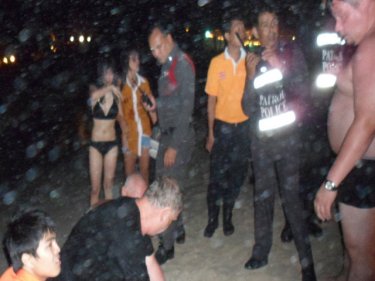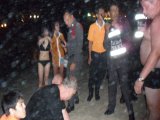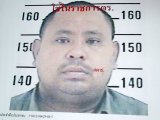A female tourist sounded the alarm on the famous west coast beach about 8.30pm last night. A jet-ski headed out, found the man after a short, desperate search, and brought him back to the beach, where tourists performed cpr in vain.
He was named as Tinqi Li, and he became the seventh tourist drowning on Phuket beaches since May 18 - an alarming number for a year-round beach holiday destination.
He was the second young tourist to drown in that period while swimming on Patong beach at night. American Joshua Shane, 21, drowned during a night swim on June 12.
Phuketwan and water safety experts have called for greater commitment by resorts and local authorities to end the needless drownings. Warning signs in Chinese are rare at Phuket beaches, where the monsoon season brings dangerous ''rip'' currents.
Holidaymakers who come to Phuket for a beach break are often unaware that the sea can be deadly at this time of year - and many resorts are reluctant to tell them in person on check-in, even though a few simple words in the appropriate language would save many lives.
Some Phuket tourism authorities view the drownings as ''natural,'' others would prefer if the tourists were always blamed. More astute authorities understand the need for prevention and are pressing for resorts to behave more responsibly.
Phuket's lifeguards are overwhelmed by the number of tourists who choose to swim even when red warning flags are flying. They say they need the help of resorts and authorities to make sure swimmers realise their lives are at risk.
One resort where guests are warned about swimming on the beaches suggests that guests are told on check-in: ''We've got a great swimming pool here. Please use it. Swim at the beach when the red flags are flying, and you'll die.''
Unless a more responsible attitude prevails, visitors are not likely to come to Phuket for beach holidays in May and June.
June 30 Chinese tourist Tinqi Li, 19, drowns while swimming at night at Patong. A jet-ski rider finds him and pulls him back to shore but cpr fails to revive him.
June 19 Unidentified Western man drowns at Nai Harn as red flags fly. Two Chinese tourists, a man and a woman, are rescued. The man is later identified as Rasmus Beyemann, 72, a Dane who had been living on Phuket for five years.
June 12 American university student Joshua Shane, 21, goes missing at Patong on a late-night swim with friends. His body is found on June 14. Another swimmer requires hospital treatment.
June 8 A tourist from Egypt and a tourist from Kuwait, visiting Phuket, go on a whitewater adventure tour north of Phuket with friends. The friends are rescued when a monsoon-boosted stream overturns their raft. The two men drown.
June 2 A young Thai visitor from Bangkok, Austatiwood Prommarat, 18, disappears into the surf at Patong after he and a relative allegedly hang their shirts on a warning red flag before going into the water. The relative is rescued.
May 31 An American kite surfer collapses in the shallows at Nai Harn, Phuket's most southerly beach, and dies soon after. His death may not have been a drowning but possibly a heart attack.
May 30 Russian tourist Denis Korobogatov, 33, appears to be caught by a ''rip'' tide at Karon beach and is dragged to his death.
May 27 Phuket's lifeguards, absent from Phuket beaches for seven weeks because of a contractual dispute, return to daily patrols of Phuket's 13 most popular west coast beaches.
May 20 On a day's outing to difficult-to-access Freedom Beach, between Patong and Karon, Frenchman Stephane Dacosta, 32, disappears into the water. He washes ashore at nearby Kata beach a day later.
May 18 With lifeguards absent from all of Phuket's beaches, Angelo Piazza, 53, disappears into the surf at Karon beach, south of Patong, and drowns.
The figure of seven beach drownings on Phuket between May 18 and June 30 contrasts with just five drownings recorded for the whole of Phuket - including deaths in ponds and canals as well as beaches - in the first four months of the year.













The Phuketwan reporting is so slanted it is beyond reproach.
This is a case of a young thrill seeker swimming in the ocean AT NIGHT!
I doubt any level of warning would have stopped them - common sense should have been the stop gap.
To once again blame the resorts and tourism authorities for this drowning is laughable on the part of the reporter.
The seas during the day light hours right now are NOT deadly as the article suggests.
If you are reading this and thinking about not coming to Phuket due to the DEADLY seas, think again.
Common sense and following the advise of the lifeguards is all you need to do to enjoy the sea around Phuket.
Posted by Bill on July 1, 2012 10:30
Editor Comment:
Resorts entice holidaymakers to Phuket during the dangerous monsoon season. Then the tourists suddenly find, as they try to swim, that they have been misinformed. You may kid yourself, Bill, but don't try to kid us. We've talked to the family and friends of the drowned. We know the causes and the solutions. It's not darkness that makes Phuket's beaches more dangerous at night. It's the same problem in daylight - lack of appropriate warnings by the people who entice the tourists here under false pretences. (By the way, you need to look up the meaning of 'beyond reproach.' Best not to use terms you don't understand.)